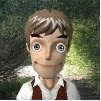


This is not what I expected to post on Number 100. But I just finished dipping into a recent bio of Syd ("A Very Irregular Head" by Rob Chapman) and went back to the solo albums... and here I am! So, Syd Barrett 101: Pink Floyd guitarist, wrote most of the first PF album "Piper at the Gates of Dawn", songs about gnomes, underwear thieves, lots of dipping into the British children's literature canon for lyrical fodder, took way too much LSD which either a: drove him mad, or b: unbalanced an already wavering psychotic, bandmates boot the liability and eventually become the Pink Floyd that conquers the world and sparks the Sex Pistols to spit on the bloated corpse of rock 'n roll. That's quite the resume to attribute to anyone, let alone a fragile talent who shattered under the pressure of being in a groundbreaking pop group.
David Gilmour, who replaced Syd as the functioning guitarist in Floyd (and who eventually wrested control from original member Roger Waters -- is this Dickensian or what?) worked with Syd to wring a solo album out of song sketches and ephemera. So much of the solo albums feel like demo or even sub-demo material, but there's a morbid fascination with hearing a looner in the studio. The problem is that, though Gilmour is sympathetic to Syd's illness and he comes across as earnest in his desire to help capture something useable, the album's producer submitted a final release including false starts that portray Syd as rambling, incoherent and tuneless. Reality TV years ahead of its time on an LP, exploitative and cruel. (The aforementioned bio paints David Gilmour as a true gentleman, who saw that Syd received the financial royalties due him. And wow, turns out you get big big bucks if you write songs for a group like Pink Floyd.)
Yet there are some good songs to be found on "The Madcap Laughs", the first of 2 'official' Syd solo releases. Same with "Barrett", the one recorded under even more dire cirumstances, but still worth hearing. And finally there's "Opel", the leftovers, or rather, songs that if polished could truly have been great. It's heartbreaking to hear the title track and realize that with some fleshing out, it could have been a real Pink Floyd song. It's the kind of reveal that makes this listener get just a hint of how we as a culture (and the record companies as an industry) nurture our geniuses just up to the point where we can eat them and suck their bones dry (see Brian Wilson for another example.)








